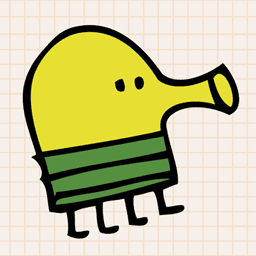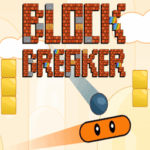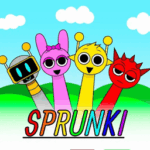Table of Contents
ToggleIntroduction to Doodle Jump
If you’ve ever tilted your phone like a steering wheel while trying not to fall into the abyss, chances are—you’ve played Doodle Jump. Released back in 2009 by the indie Croatian studio Lima Sky, this quirky little game quickly bounced its way into the hearts (and home screens) of millions around the globe. You control a green, four-legged creature called the Doodler, whose only goal is to jump higher and higher across an endless series of platforms. It sounds simple—and it is—but that’s the charm. Available on everything from iOS and Android to Xbox 360, Doodle Jump remains a mobile classic for a reason.
Developer Background and Game History
Doodle Jump was brought to life by two Croatian brothers, Igor and Marko Pušenjak, under their indie studio Lima Sky. What started as a simple idea turned into a global phenomenon. The game first landed on iOS in March 2009, and it didn’t stop there. It soon jumped over to Android and BlackBerry in 2010, made its way to Windows Phone in 2011, and even found a spot on the Xbox 360 using Kinect.
Despite its minimal graphics and straightforward concept, Doodle Jump received praise for its engaging gameplay and clever use of motion controls. Over the years, it’s racked up millions of downloads and earned its place as one of the most iconic mobile games of all time.
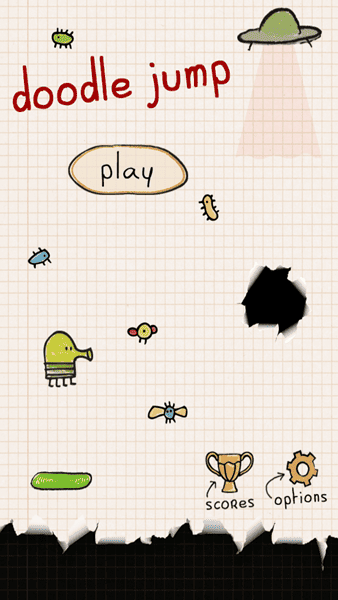
Gameplay Mechanics: How Doodle Jump Works
The moment you start Doodle Jump, you’re thrown into a never-ending climb—literally. You control the Doodler, a small green creature with springy legs and a big goal: go up. No story, no levels, just platform after platform reaching toward the sky.
You’ll tilt your phone (or use arrow keys if you’re playing on desktop) to move left and right. It feels a bit like balancing on a trampoline with jet boots. Tap or click to shoot at anything in your way—like monsters, UFOs, or the dreaded black holes that can suck you in without warning.
The platforms aren’t always friendly, either. Some move. Some break. Some disappear. And you? You’ll keep jumping, dodging, and hoping your reflexes don’t fail at 20,000 points.
Features and Game Worlds
Doodle Jump isn’t just about jumping—it’s about where you’re jumping. One minute you’re bouncing through a snowy winter wonderland, the next you’re dodging rockets in outer space. There are over 11 themed worlds—like Ninja, Jungle, Halloween, and even Underwater—each with its own look, feel, and tricky surprises.
Power-ups are your best friends up there. Grab a jetpack and you’ll shoot skyward like a bottle rocket. Land on a spring or trampoline, and you’ll bounce with satisfying height. But not every platform has your back. Some platforms move, some vanish under your feet, and some explode if you’re not careful.
I still remember the first time I hit an exploding platform in the Halloween world—I jumped straight into a monster right after. Painful. Lesson learned.
You can chase achievements, compare scores on global leaderboards, or race against your friends if you’re feeling competitive. It’s chaotic, unpredictable, and weirdly addicting.
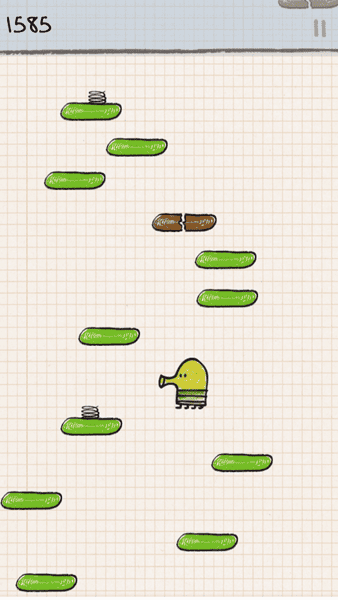
Comparison with Other Games in the Genre
If you’ve played Flappy Bird, you’ll recognize the same kind of “just one more try” energy in Doodle Jump. But where Flappy Bird punishes every small mistake with instant failure, Doodle Jump gives you a little more room to breathe—and bounce.
Games like Stickman Hook rely on horizontal, swing-based movement, which feels more like surfing on strings. Doodle Jump, in contrast, is all about vertical momentum and split-second reactions.
Even the Dinosaur Game on Chrome shares that endless-runner DNA, but Doodle Jump adds depth with power-ups, dynamic platforms, and monsters that keep each run fresh. It’s more than timing—it’s adaptation.
Game Controls and Platform-Specific Behavior
Controls in Doodle Jump are simple, but they feel different depending on where you play.
On desktop:
- Use the Left and Right Arrow Keys to move
- Use Up Arrow/Click to shoot
It’s straightforward, but aiming can feel a bit twitchy at first.
On mobile:
The experience is more fluid. You tilt your device to steer the Doodler—like balancing a marble on a tray—and tap the screen to shoot. Some modes even offer auto-fire, which is handy in chaotic moments.
Projectile physics can vary too—some shots fly straight, others arc slightly depending on the theme
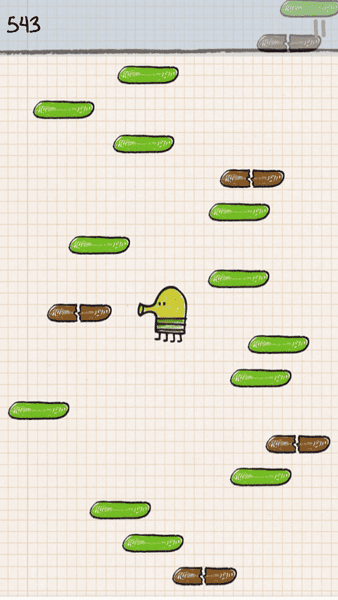
Tips to Improve Your Gameplay
Getting better at Doodle Jump isn’t just about fast reflexes—it’s about control and awareness. First, learn your jump height. The Doodler always jumps the same distance, so knowing your limit helps with those edge-of-the-screen landings. Some players practice by jumping at the very edge of a platform—just a pixel away from missing—to sharpen their feel for vertical range.
The edges of the screen are your secret weapon. Since the game wraps around, you can move off one side and reappear on the other. Top players use this to avoid monsters or reach distant platforms that would otherwise seem out of range.
When it comes to shooting, don’t just spam. In Astronaut mode, for example, the laser fires in a straight line, giving you better aim. Take time to line up shots. Want to practice? Try Soccer mode—it’s loaded with targets.
And finally, treat each run like a rhythm. The best players aren’t tense—they’re relaxed and focused. If you’re too conscious of your score, you’re more likely to mess up.
Strategy for Advanced Levels and Obstacles
After 30+ hours of gameplay, I’ve learned that higher scores come from muscle memory and mindset—not luck. Advanced runs demand focus. Platforms start shifting, breaking, and even exploding under your feet. You’ll need to read their behavior instantly. I once jumped on what looked like a regular platform, only for it to vanish mid-air—game over.
Black holes are silent killers. You don’t always see them until it’s too late, especially in Halloween mode. The trick? Keep platforms at the bottom edge of your screen in memory.
Stick to one theme for a while. Each world has different visuals, and consistency helps you recognize threats faster. And above all—stay calm. The moment you chase your high score too hard, you’re done.
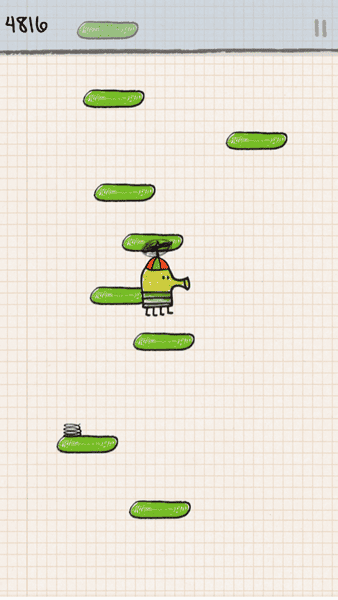
Player Review: My Honest Thoughts as a Gamer
After countless late nights and 40+ hours of climbing, I can say Doodle Jump never really gets old. There’s something weirdly calming about dodging UFOs while riding a spring into the unknown. I’ve hit the Sharp Shooter achievement, landed mid-air saves by pure instinct, and still—every time I fall—it feels personal. It’s a game that quietly earns your respect.
Why Doodle Jump Stands the Test of Time
There’s a reason Doodle Jump is still going strong more than a decade later. It’s fast, fun, and endlessly replayable. The controls are simple—tilt or tap—but the challenge ramps up fast. Every session feels different thanks to its shifting platforms, weird enemies, and colorful worlds.
I’ve watched it go from an early iPhone favorite to a quiet legend among mobile games. It’s not flashy, but that’s the point. It’s pure, focused gameplay—and that never really goes out of style.
Conclusion and Final Thoughts
Doodle Jump has earned its place as a classic—simple, challenging, and oddly addictive. Whether you’re killing time or chasing your next high score, it’s a game that just works. If you’ve never tried it (or haven’t in years), give it a shot on Classroom6x Hub. You might not stop jumping.

